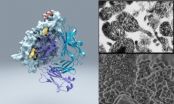(Press-News.org) Washington, DC (February 6, 2014) — A chemical that can accumulate in seafood and is known to cause brain damage is also toxic to the kidneys, but at much lower concentrations. The findings, which come from a study appearing in an upcoming issue of the Journal of the American Society of Nephrology (JASN), suggest that officials may need to reconsider what levels of the toxin are safe for human consumption.
The world's oceans contain algae that produce certain chemicals that can be harmful to humans and other living creatures. Many of these chemicals are considered neurotoxins because they cause damage to the brain. The neurotoxin domoic acid, also called "Amnesic Shellfish Poisoning," is a very stable, heat resistant toxin that is becoming more prominent in coastal regions, likely due to environmental changes. It can accumulate in mussels, clams, scallops, and fish, and the FDA has set a legal limit of domoic acid in seafood based primarily on its adverse neurological effects.
Because domoic acid is cleared from the body by the kidneys, P. Darwin Bell, PhD, Jason Funk, PhD (Medical University of South Carolina), and their colleagues looked to see if the toxin might also have detrimental effects on these organs. By giving mice varying doses of domoic acid and the assessing animals' kidney health, the team found that the kidney is much more sensitive to this toxin than the brain.
"We have found that domoic acid damages kidneys at concentrations that are 100 times lower than what causes neurological effects," said Dr. Bell. "This means that humans who consume seafood may be at an increased risk of kidney damage possibly leading to kidney failure and dialysis."
While the findings need to be verified in humans, the researchers would like to see increased awareness and monitoring of domoic acid levels in all seafood. They say that the FDA may also need to reconsider the legal limit of domoic acid in food due to its kidney toxicity.
INFORMATION:
Study co-authors include Michael Janech, PhD, Joshua Dillon, John Bissler, MD, and Brian Siroky, PhD.
Disclosures: John Bissler, MD receives grant funding and honoraria from Novartis and has participated in its advisory boards. This study was supported, in part, by funds from the NIH, VA, DOD, and Dialysis Clinic, Inc.
The article, entitled "Characterization of Renal Toxicity in Mice Administered the Marine Biotoxin Domoic Acid," will appear online at http://jasn.asnjournals.org/ on February 6, 2014.
The content of this article does not reflect the views or opinions of The American Society of Nephrology (ASN). Responsibility for the information and views expressed therein lies entirely with the author(s). ASN does not offer medical advice. All content in ASN publications is for informational purposes only, and is not intended to cover all possible uses, directions, precautions, drug interactions, or adverse effects. This content should not be used during a medical emergency or for the diagnosis or treatment of any medical condition. Please consult your doctor or other qualified health care provider if you have any questions about a medical condition, or before taking any drug, changing your diet or commencing or discontinuing any course of treatment. Do not ignore or delay obtaining professional medical advice because of information accessed through ASN. Call 911 or your doctor for all medical emergencies.
Founded in 1966, and with more than 14,000 members, the American Society of Nephrology (ASN) leads the fight against kidney disease by educating health professionals, sharing new knowledge, advancing research, and advocating the highest quality care for patients.
Highlights
Domoic acid accumulates in seafood and is toxic to the brain
The toxin damages kidneys at concentrations that are 100 times lower than what causes neurological effects.
Toxin in seafood causes kidney damage in mice at levels considered safe for consumption
FDA may need to reconsider what levels of domoic acid in shellfish and fish are safe
2014-02-06
ELSE PRESS RELEASES FROM THIS DATE:
Acute kidney injury may be a risk factor for later heart problems
2014-02-06
Washington, DC (February 6, 2014) — Patients who experience abrupt kidney injury following surgery have an increased risk of later developing heart problems, according to a study appearing in an upcoming issue of the Journal of the American Society of Nephrology (JASN). The findings suggest that properly treating and monitoring patients with acute kidney injury (AKI) could help protect their heart health.
AKI, an sudden decline in kidney function, is an increasingly prevalent and potentially serious condition in hospitalized patients. Sometimes acute kidney injury arises ...
Reduce the chloride to restore the switch
2014-02-06
This news release is available in French. A drug given to pregnant mice with models of autism prevents autistic behavior in their offspring, a new report shows, and though the drug could not be administered prenatally in humans (there is no way to screen for autism in human fetuses), clinical trials of this drug administered later in development, in young children who have already developed autistic symptoms, are showing progress.
The causes of autism spectrum disorder, or ASD, are complex and not well understood.
Prolonged excitation of brain neurons seems partly ...
The ultimate decoy: Scientists find protein that helps bacteria misdirect immune system
2014-02-06
LA JOLLA, CA—February 6, 2014—A team led by scientists at The Scripps Research Institute (TSRI) has discovered an unusual bacterial protein that attaches to virtually any antibody and prevents it from binding to its target. Protein M, as it is called, probably helps some bacteria evade the immune response and establish long-term infections.
If follow-up studies confirm Protein M's ability to defeat the antibody response, it is likely to become a target of new antibacterial therapies. The protein's unique ability to bind generally to antibodies also should make it a valuable ...
Decoding dengue and West Nile: Researchers take steps toward control of health proble
2014-02-06
ANN ARBOR—Dengue fever and West Nile fever are mosquito-borne diseases that affect hundreds of millions of people worldwide each year, but there is no vaccine against either of the related viruses.
A team of scientists at the University of Michigan and Purdue University has discovered a key aspect both to how the viruses replicate in the cells of their host and how they manipulate the immune system as they spread.
In a study scheduled for online publication Feb. 6 in the journal Science, researchers led by Janet Smith of the U-M Life Sciences Institute describe for ...
Autism: Birth hormone may control the expression of the syndrome in animals
2014-02-06
This news release is available in French.
The scientific community agrees that autism has its origins in early life—foetal and/or postnatal. The team led by Yehezkel Ben-Ari, Inserm Emeritus Research Director at the Mediterranean Institute of Neurobiology (INMED), has made a breakthrough in the understanding of the disorder. In an article published in Science, the researchers demonstrate that chloride levels are elevated in the neurons of mice used in an animal model of autism, and remain at abnormal levels from birth. These results corroborate the success obtained ...
Opening 'the X-files' helped researchers to understand why women and men differ in height
2014-02-06
Researchers from the University of Helsinki analyzed thoroughly the commonly occurring genetic variation in chromosome X, one of the two sex-determining chromosomes, in almost 25,000 Northern European individuals with diverse health-related information available. The aim of the study was to find genetic factors that could explain individual differences in several traits, including BMI, height, blood pressure and lipid levels. In addition, the researchers also investigated whether the X chromosome would contribute to some of the well-known differences between men and women ...
Theorists predict new forms of exotic insulating materials
2014-02-06
CAMBRIDGE, Mass-- Topological insulators — materials whose surfaces can freely conduct electrons even though their interiors are electrical insulators — have been of great interest to physicists in recent years because of unusual properties that may provide insights into quantum physics. But most analysis of such materials has had to rely on highly simplified models.
Now, a team of researchers at MIT has performed a more detailed analysis that hints at the existence of six new kinds of topological insulators. The work also predicts the materials' physical properties in ...
Researchers pinpoint protein associated with canine hereditary ataxia
2014-02-06
Researchers from North Carolina State University have found a link between a mutation in a gene called RAB 24 and an inherited neurodegenerative disease in Old English sheepdogs and Gordon setters. The findings may help further understanding of neurodegenerative diseases and identify new treatments for both canine and human sufferers.
Hereditary ataxias are an important group of inherited neurodegenerative diseases in people. This group of diseases is the third most common neurodegenerative movement disorder after Parkinson's and Huntington's diseases.
In people with ...
Nutritional supplement improves cognitive performance in older adults, study finds
2014-02-06
Tampa, FL (Feb. 6, 2014) – Declines in the underlying brain skills needed to think, remember and learn are normal in aging. In fact, this cognitive decline is a fact of life for most older Americans.
Therapies to improve the cognitive health of older adults are critically important for lessening declines in mental performance as people age. While physical activity and cognitive training are among the efforts aimed at preventing or delaying cognitive decline, dietary modifications and supplements have recently generated considerable interest.
Now a University of South ...
Immune system 'overdrive' in pregnant women puts male child at risk for brain disorders
2014-02-06
Johns Hopkins researchers report that fetal mice — especially males — show signs of brain damage that lasts into their adulthood when they are exposed in the womb to a maternal immune system kicked into high gear by a serious infection or other malady. The findings suggest that some neurologic diseases in humans could be similarly rooted in prenatal exposure to inflammatory immune responses.
In a report on the research published online last week in the journal Brain, Behavior and Immunity, the investigators say that the part of the brain responsible for memory and spatial ...
LAST 30 PRESS RELEASES:
Wiley to expand Advanced Portfolio
Invisible battery parts finally seen with pioneering technique
Tropical forests generate rainfall worth billions, study finds
A yeast enzyme helps human cells overcome mitochondrial defects
Bacteria frozen in ancient underground ice cave found to be resistant against 10 modern antibiotics
Rhododendron-derived drugs now made by bacteria
Admissions for child maltreatment decreased during first phase of COVID-19 pandemic, but ICU admissions increased later
Power in motion: transforming energy harvesting with gyroscopes
Ketamine high NOT related to treatment success for people with alcohol problems, study finds
1 in 6 Medicare beneficiaries depend on telehealth for key medical care
Maps can encourage home radon testing in the right settings
Exploring the link between hearing loss and cognitive decline
Machine learning tool can predict serious transplant complications months earlier
Prevalence of over-the-counter and prescription medication use in the US
US child mental health care need, unmet needs, and difficulty accessing services
Incidental rotator cuff abnormalities on magnetic resonance imaging
Sensing local fibers in pancreatic tumors, cancer cells ‘choose’ to either grow or tolerate treatment
Barriers to mental health care leave many children behind, new data cautions
Cancer and inflammation: immunologic interplay, translational advances, and clinical strategies
Bioactive polyphenolic compounds and in vitro anti-degenerative property-based pharmacological propensities of some promising germplasms of Amaranthus hypochondriacus L.
AI-powered companionship: PolyU interfaculty scholar harnesses music and empathetic speech in robots to combat loneliness
Antarctica sits above Earth’s strongest “gravity hole.” Now we know how it got that way
Haircare products made with botanicals protects strands, adds shine
Enhanced pulmonary nodule detection and classification using artificial intelligence on LIDC-IDRI data
Using NBA, study finds that pay differences among top performers can erode cooperation
Korea University, Stanford University, and IESGA launch Water Sustainability Index to combat ESG greenwashing
Molecular glue discovery: large scale instead of lucky strike
Insulin resistance predictor highlights cancer connection
Explaining next-generation solar cells
Slippery ions create a smoother path to blue energy
[Press-News.org] Toxin in seafood causes kidney damage in mice at levels considered safe for consumptionFDA may need to reconsider what levels of domoic acid in shellfish and fish are safe


